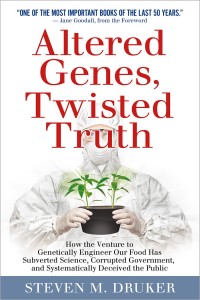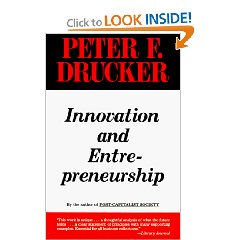 More ImportantThan Ever as Boundaries Blur, February 2, 2008
More ImportantThan Ever as Boundaries Blur, February 2, 2008
Peter F. Drucker
I realized a few years ago that government as we know it is a complete failure. The US Government as we know it has failed to provide for domestic or global security, has failed to spend our money wisely, and it is broken across all three branches. At the same time, the political parties, corporations, bankers and many asset managers, have also failed, along with the media, religion, and labor unions. I decided two years ago to create the Earth Intelligence Network along with 23 other co-founders, and yesterday the IRS told me they planned to approve our 501c3 letter, so I pulled this down to refresh myself, and was surprised to find that I had read it but not reviewed it.
The book was first published in 1990 and includes interviews with nine contributors as well as original material from Peter Drucker.
Two sentences stand out for me:
1) The non-profit delivers a changed human being.
2) The non-profit leader is responsible for translating glorious mission statements into executable, measureable, visible specifics.
After a year's work with many others, and aided immensely by the recent identification of the ten high-level threats to humanity in priority order, courtesy of LtGen Dr. Brent Scowcroft, USAF (Ret) and other members of the United Nations High-Level Threat Panel we not only recognized that the lines are blurring as segments of government that are honest, segments of private sector marketplaces that are moral, segments of civil society that are committed to responsible stewardship of their local communities and areas and non-plenishable natural resources; but we began to see the non-profit as central to weaving a shared understanding of the threats, the policies and budgets that can eradicate the threats, and the knowledge that needs to be transferred to Brazil, China, India, Indonesia, Iran, Russia, Venezuela, and Wild Cards like the Congo, if they are to avoid our mistakes.
This book, in short, is my crutch, my reinforcement, my inspiration, and my proof positive that we can translate our mission into specifics, and do what we have set out to do.
Early on Peter Drucker emphasizes that while the non-profit is the largest employer in America, the share of money being donated to non-profits has remained relatively steady. I suspect that has changed since this was written in 1990, but his second key point in this context is that it is not enough to find donors, one much recruit contributors who wish to be active “in community” and for acommon purpose.
I confess to not being a people person, but I will also be an unpaid member of the board, so I would emphasize that in looking for our first non-profit manager, we are going to look for someone with three skills this books helps describe:
1) Ability to create logical executable specifics
2) Ability to interact effectively with high-end planned givers (humans)
3) Ability to recruit and keep happy passionate people who love life and want to pursue life-affirming, world-changing objectives.
The middle core of the book has a lot of underlining. Here are some of the highlights.
+ Strategies are the bulldozers.
+ Strategies are action-focused with measureable results.
+ Set the goals twice as high as a “normal” or business as usual organization might aspire to.
+ Tailor the message to each unique segment (e.g. one message for foundations seeking to harmonize high-end spending programs; another for individual donors seeking to find the best possible way to contribute $100 to one needy person anywhere (hint: cell phone and paid annual subscription–one per village will change the world).
+ Training matters, and not just of staff; also of donors, volunteers, everyone being helped or in any way engaged in the overall mission. [In my terms, if someone cannot recide the ten threats, twelve policies, and eight challengers form memory, or know where to find the 52 transpartisan answers to 52 tough questions, then we have failed to train them or educate them.]
+ Planning is not just about objective results, but about a vast social network of relationships that need to be nurtured for the long-term.
+ Dissent is priceless, discourtesy should never be tolerated.
+ Page 115: “The most important *do* (italicized in original) is to build the organization around information and communication instead of around hierarchy.” See the image above, something I created in the 1990's. All the candidates running for President today are top down command and control freaks, with one possible exception. Epoch B leaders create a bottom up constant churn of information, and for me, this one sentence validated, reinforced, and inspired.
+ Educate up the chain and sideways, not just downwards.
+ Ensure every person is immersed the real-world (e.g. poverty at its worse in the slums of Rio de Janeiro or Caracas) so that they are refreshed as to the reality and the meaning of their mission the rest of the year.
I was very surprised to find a chapter on “How to Make the Schools Accountable,” pages 131-142, an interview with Albert Shanker, at the time president of the American Federation of Teachers AFL-CIO, but it fits perfectly. Three points:
1) CEOs and Labor Leaders need to hold schools accountable.
2) Schools that pursue long-term deep learning find that short-term financial and other objectives fall into place.
3) Hold everyone accountable for giving their all, and end complacency, a sense of tenure, a lack of passion for what should be a life-affirming world-changing endeavor (those words are from other books, see list below).
The index is excellent, and the last page of the book educated me on the continuing value and offerings of The Drucker Foundation.
My take-away from this book is that any strategy that focuses on sharing information with as many parties as possible, and finding ways to optimize sense-making of the collective, and harmonization of many different programs and budgets across multinational, multiagency, multidisciplinary, multidomain boundaries, will in the end produce results that no amount of government mandate, corporate bribery, foundation give-away, or wailing calls of doom, could possibly achieve.
Peter Drucker's legacy adds a new line to an old saying; the last line below:
The men who manage men manage the men who manage things.
The men who manage money manage all.
The men who manage information not only manage the men who manage money, they create new open money, information capital that enhances, influences, and exploits all else.
Great book. The audio series is ideal for those driving back and forth from bedroom communities into big cities, and vice versa.
Other links to books I have reviewed and recommend:
The Fortune at the Bottom of the Pyramid: Eradicating Poverty Through Profits (Wharton School Publishing Paperbacks)
How to Change the World: Social Entrepreneurs and the Power of New Ideas, Updated Edition
The Politics of Fortune: A New Agenda For Business Leaders
Blessed Unrest: How the Largest Movement in the World Came into Being and Why No One Saw It Coming
The Tao of Democracy: Using Co-Intelligence to Create a World That Works for All
Society's Breakthrough!: Releasing Essential Wisdom and Virtue in All the People
One from Many: VISA and the Rise of Chaordic Organization
Building a Knowledge-Driven Organization
Global Assemblages: Technology, Politics, and Ethics as Anthropological Problems
The Wealth of Networks: How Social Production Transforms Markets and Freedom
I do not list books I have written, edited, or published, but urge the reader to consider some of them as well. In early March we will be publishing COLLECTIVE INTELLIGENCE: Creating a Prosperous World at Peace, that is free online now and forever more, and then in May, free online from April, PEACE INTELLIGENCE: Assuring a Good Life for All. And finally, in July, free online in June, COMMERCIAL INTELLIGENCE: From Moral Green to Golden Peace.
I am certain that public intelligence and bottom-up self-governances are going to put an end to fraud, waste, abuse, corruption and secret earmarks, and that the non-profit, and those who share rather than hoard informationl, will in fact save the world and profit handsomely from doing so, on multiple levels, not least of which is giving seven generations of their descendants a sustainable Earth where everyone is a billionaire (Medard Gabel's vision).







